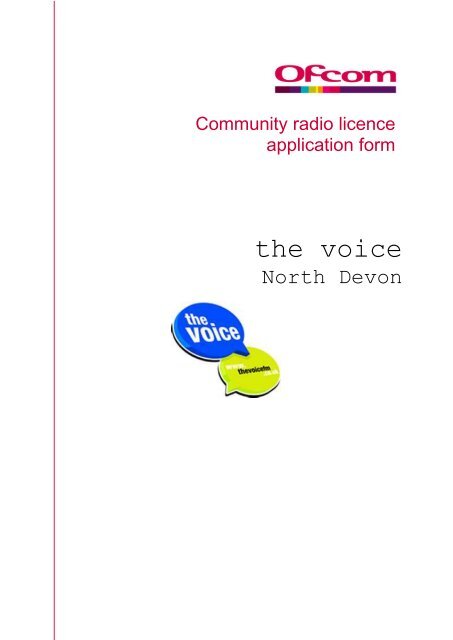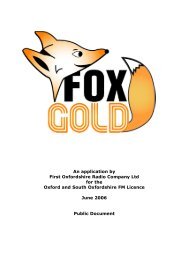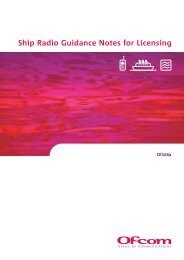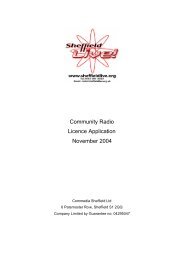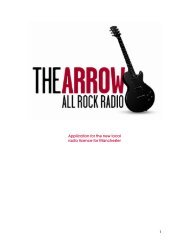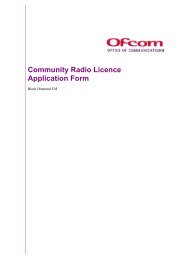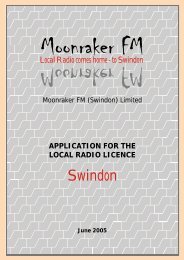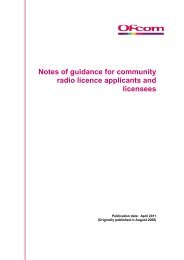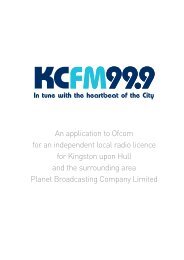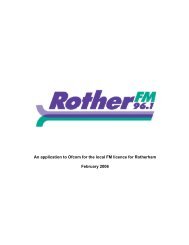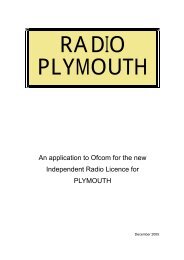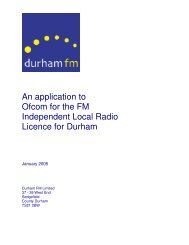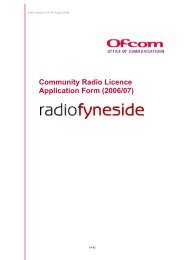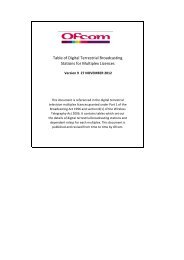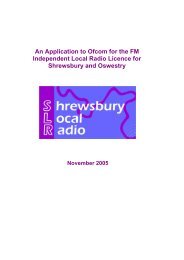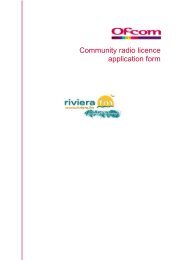The Voice - Ofcom Licensing
The Voice - Ofcom Licensing
The Voice - Ofcom Licensing
You also want an ePaper? Increase the reach of your titles
YUMPU automatically turns print PDFs into web optimized ePapers that Google loves.
Community radio licence<br />
application form<br />
the voice<br />
North Devon
1. Station Name<br />
What is the proposed station name?<br />
Answer:<br />
<strong>The</strong> <strong>Voice</strong><br />
2. Community to be served<br />
Community radio application form<br />
Define the community or communities you are proposing to serve. Drawing from various sources of data (e.g.<br />
from the Office of Population, Census and Survey) and in relation to your proposed coverage area, please<br />
determine the size of the population concerned and the make-up of the population as a whole, along with any<br />
relevant socio-economic information that would support your application.<br />
(Please tell us the sources of the information you provide.)<br />
Answer in fewer than 300 words:<br />
<strong>The</strong> <strong>Voice</strong> proposes to serve the communities of North Devon, including Barnstaple and Bideford, the<br />
two main commercial centres of the region, and Braunton, gateway to the world renowned surfing<br />
beaches.<br />
We would also like to include Ilfracombe and surrounding villages with a relay transmitter. Ilfracombe<br />
is North Devon‟s largest seaside town and Devon‟s most northerly town.<br />
<strong>The</strong> proposed DAB coverage plan shows Ilfracombe and the north coast not receiving a<br />
digital signal; therefore potentially 20,000 people would lose commercial and BBC local radio<br />
come digital switchover.<br />
Ilfracombe's Central and East wards reflect the resort‟s long-term decline, showing multiple<br />
signs of deprivation, especially in unemployment, low skills, low incomes, health problems,<br />
child poverty and debt.<br />
Both wards are recognised regionally and nationally as priorities for neighbourhood renewal.<br />
<strong>The</strong> Indices of Multiple Deprivation 2004 show part of Ilfracombe Central ward in the most<br />
deprived 8% of areas in the country, with the remainder in the most deprived 18%.<br />
<strong>The</strong> topography of North Devon is such that radio signals are weak or blocked in many cases,<br />
severely restricting choice for the public in these areas.<br />
In terms of total population, the core community towns are Barnstaple – 25,199*, Bideford and<br />
Northam – 23,424*, Braunton – 8,352* and Ilfracombe – 12,544*, a total of 69,519*.<br />
<strong>The</strong> intended broadcast coverage of North Devon and North Torridge would serve a total population<br />
of 110,000* people. <strong>The</strong>re are 92,754* adults 15+, of which 23,378* are senior citizens, 65+. We<br />
consider our target audience will be 30 – 69 year olds, accounting for 58,135* people.<br />
Beyond the core population centres the area is quite rural and communication is mainly by two<br />
regional newspapers, both published weekly.<br />
Tourism and farming are the two largest industries in the area, and during the holiday season the<br />
population can more than double.<br />
*(source Devon County Council 2010 figures)<br />
3. Proposed area<br />
What is the area you propose to serve?<br />
Answer:<br />
Although historically community radio stations have been severely restricted in terms of coverage<br />
radius, North Devon considers itself to be one community; it is a large predominantly rural area with a<br />
1
Community radio application form<br />
number of dispersed key population centres of modest size, with the majority of people living and<br />
working within the community.<br />
<strong>The</strong>refore we ask that OFCOM consider North Devon as a special case due to its geographically<br />
dispersed settlements, and allow us to cover the towns of Barnstaple, Bideford and Braunton. We<br />
also ask that you consider allowing a second transmitter to cover the town of Ilfracombe and the<br />
northern coast which is isolated.<br />
Due to the restrictions in transmitter power and TX aerial height, and taking into account topography<br />
and adverse terrain, Barnstaple and Bideford would be best served with separate transmitters in order<br />
to give full and comprehensive cover. However we feel it is vitally important to also provide a much<br />
needed service to Ilfracombe which definitely requires its own TX. <strong>The</strong>refore we have sought to find a<br />
compromise site between Barnstaple and Bideford in order to serve both towns as best we can from<br />
one TX point, requiring just one additional TX for Ilfracombe. If however <strong>Ofcom</strong> were to consider 3 TX<br />
sites in light of the challenging landscape of the area, we would be able to provide excellent service to<br />
the core community centres.<br />
Ilfracombe is North Devon‟s largest seaside town and Devon‟s northern most town. <strong>The</strong>re is a ridge<br />
of high ground that runs east to west just inland from the Bristol Channel coast; therefore most of the<br />
settlements along the north coastline, including Ilfracombe and Combe Martin are on the wrong side<br />
of the high ground to receive an FM signal from the main transmitters at Huntshaw Cross. Lantern<br />
FM (now Heart) had to install a repeater transmitter to cover Ilfracombe, and to this day there is very<br />
poor and patchy reception of BBC Radio Devon on FM. Come digital switchover, the only radio the<br />
north coast will be able to receive under current coverage proposals will be national services.<br />
Ilfracombe like many seaside towns has experienced long-term decline with some areas being within<br />
the most deprived in the country. Historically the town has often felt cut off and ignored, but over<br />
recent years there has been a focus of resources from district and county councils to support, assist<br />
and help the regeneration of the town. Ilfracombe needs to feel part of North Devon – community<br />
radio can help achieve this by ensuring it is an integral part of its programming.<br />
To put it into perspective, the population of the city of Exeter is the same as that of the whole of north<br />
Devon, again one community, but easily covered by a 5 km radius.<br />
Programmes and programme output:<br />
Definitions:<br />
Studio location: <strong>The</strong> studio from which the service will be broadcast should be located within the licensed area.<br />
(In some instances, and by prior written agreement from <strong>Ofcom</strong>, it may be acceptable for the primary studio to be<br />
located outside the licensed area.)<br />
Locally-produced: it is anticipated that most stations will produce the bulk of their output themselves, in the<br />
locality. However, for some target communities it may be appropriate for fairly high levels of output to originate<br />
from outside the licensed area.<br />
Live output: is that which is produced by a presenter in the studio at the time of broadcast. <strong>The</strong> amount of live<br />
output may vary between different services depending on the needs or expectations of the target community.<br />
Peak time: it may be helpful to state what material will be broadcast in „peak time‟. If you do, please say what you<br />
consider peak time to be for your target community (this may vary from station to station).<br />
Automated output/voice-tracked material: most stations will carry automated output at some time. <strong>The</strong> amount of<br />
automated or voice-tracked material does not need to be specified in the key commitments.<br />
Sustaining service/third party produced material: if you intend to broadcast material produced by a different<br />
organisation please state what it is and how much (per day or week as appropriate).<br />
4. Programming output<br />
Please fill-in all three questions below<br />
Question A asks you to describe your programme service.<br />
Question B relates to how your output will serve the tastes and interests of your target community.<br />
Question C is about how your service will broaden the range of local (non-BBC) services available in your<br />
area.<br />
2
Community radio application form<br />
Later in this form you will be asked to draft your own „key commitments‟. This will form the basis of your licence<br />
and is what <strong>Ofcom</strong> will judge you against. It should include a summary of your proposed programme output as<br />
set out below and reflect your commitment to cater for relevant tastes and interests, to broaden the range of<br />
relevant programmes and services and to provide a service with a distinct nature and content as set out in the<br />
Guidance Notes in the column opposite.<br />
4. Programming output<br />
A: Please tell us about your programme service <strong>The</strong> following questions may help you describe your<br />
programme service (but should only be used as a guide):<br />
What will the service sound like?<br />
What music will you play?<br />
What are the main speech elements of the service and how will the social gain/community benefits you<br />
propose be reflected on-air?<br />
What is the likely music to speech ratio?<br />
Will this vary at different times of the day or week (or year)?<br />
Do you intend to broadcast live output? If so when and how much do you propose to do?<br />
Will you broadcast in languages other than English (what languages and how much)?<br />
Will your output be original i.e. produced for your service alone?<br />
Will it be locally produced?<br />
Do you intend to repeat material?<br />
Answer in fewer than 1,000 words:<br />
<strong>The</strong> <strong>Voice</strong> proposes a service whose backbone will be popular music with a broad appeal, from most<br />
genres spanning the past five decades, mixed with selected current and new releases. Our music<br />
„style‟ will be aimed at an audience aged 30 to 69.<br />
<strong>The</strong> vast majority of programmes will be presented and produced by local presenters, people who live<br />
and work in the area, and this will be enhanced by local people who have taken part in our training<br />
programme. <strong>The</strong> majority of programme guests and contributors will also be local people.<br />
We will also actively encourage and promote local artists and bands, with regular features, interviews<br />
and sessions during our evening shows, with a selection of their material being scheduled for playout<br />
sparingly through the day.<br />
During recent RSL‟s this proved very popular, with listeners saying how refreshing it is to hear such a<br />
variety of music compared to the same oldies constantly repeated as is the case with other services<br />
whose music base appears very limited. Evenings will have more of a focus on the vibrant local music<br />
scene, again this proved very successful during recent RSL‟s, and with local artists either providing<br />
pre recorded items or performing live in the studio. Weekends will have a similar feel to weekdays but<br />
perhaps with a number of specialist music programmes such as “the Old Record Club”<br />
Consistency of output is vitally important to the overall station sound and positioning, music has to<br />
flow rather than jump and jar – Lady Gaga to Dean Martin to the Rolling Stones to Katherine Jenkins<br />
doesn‟t work for the majority of people, and would disorientate an audience and drive them away.<br />
Speech elements will consist of information on events in and around the area, local authority news,<br />
community news, discussion forums, information about interest organisations, charity promotions,<br />
educational promotion, promoting and involving local arts, drama and music groups. We envisage a<br />
75% 25% music speech ratio during live locally produced programming, although this could vary<br />
through a broadcasting day. It is important to get the speech/music balance right, as well as the<br />
length of speech items.<br />
During the midday show, we intend to have regular advice features covering various local issues and<br />
topics and subjects of general interest to the listener. <strong>The</strong>se will include legal and finance, travel and<br />
gardening, and where possible we will encourage listener involvement, feedback and interaction. We<br />
will work with local agencies to help promote and publicise their services and activities, and to<br />
encourage listeners to take advantage of advice services, benefits and employment opportunities<br />
within the area. As well of being of general interest, this would be particularly beneficial to Ilfracombe.<br />
Participants of our training scheme will have the opportunity for suitable pre recorded features and or<br />
work to be broadcast and those participants wishing to continue their radio experience following<br />
3
Community radio application form<br />
completion of the course will have the opportunity to develop and hone their presentation skills and to<br />
present live programmes.<br />
Although our target audience will be predominantly 30+, we will contact and work with schools and<br />
colleges to promote media studies and to encourage involvement in their local radio station, and as<br />
part of our programming we will actively promote their events and activities.<br />
We will provide national and international news hourly, and develop partnerships with local<br />
organisations, public bodies and media to build a local news service. Initially local news items will be<br />
broadcast as elements of live programming, but we plan to develop local news bulletins during peak<br />
programmes (weekday breakfast and drive).<br />
Although we pledge to broadcast a minimum of 6 hours a day live with locally produced programmes,<br />
our intention from day one is to broadcast live output from breakfast show 07.00 to 09.00, midday<br />
show from 10.00 to 13.00, drive time from 16.00 to 19.00 and evenings 19.00 to 22.00<br />
Broadcast output will be in English only.<br />
We will have a small number of pre recorded programmes produced specifically for us remotely;<br />
these will generally be transmitted during late evenings and overnight<br />
Some material, such as specialist programmes, interviews and features, may be re broadcast,<br />
depending on content, interest value and relevance.<br />
B: Based on what you have said above, how will your proposed radio service cater for the tastes and<br />
interests of your target community/communities?<br />
Answer in fewer than 400 words:<br />
<strong>The</strong> <strong>Voice</strong> will draw upon the knowledge of members of its group who collectively have in excess of<br />
70 years experience of producing and presenting truly local radio for the people of North Devon and<br />
Torridge – as well as living and working in the area for many years, these people have an intimate<br />
and in depth knowledge of what the people of the area want from their local radio service. <strong>The</strong>y have<br />
been part of local radio in the region ever since the launch of Lantern FM in the early 1990‟s, since<br />
when they have been very closely involved with and have an intimate knowledge of the local<br />
communities.<br />
Since the birth of the campaign to bring local radio back to North Devon we have produced 5 28 day<br />
RSL‟s, during which we have engaged with the local community to canvas their views, wishes and<br />
expectations, and sought feedback in order to produce a service that is both wanted and needed by<br />
the communities of the area.<br />
We will have a Community Radio Advisory Panel set up which will consist of members of the public<br />
and representatives from local businesses, organisations and charities as well as local authorities.<br />
<strong>The</strong> panel will meet a minimum of twice a year to advise the station on the quality of its output and<br />
observations about content. We will use this feedback to fine tune and where possible enhance our<br />
schedule and programme content to better serve our target audience. Opportunities for listeners to<br />
provide feedback and comments will be actively encouraged both on air and through our website.<br />
We are also developing an e newsletter which will be sent out to subscribers and members of „Friends<br />
of <strong>The</strong> <strong>Voice</strong>‟ on a regular basis.<br />
<strong>The</strong>re will be an „open door‟ policy for almost all of our live programmes, encouraging interaction<br />
between listeners and the radio station by using the telephone, text messaging and emails, We are<br />
also fully aware of the phenomenal growth of social media, this we will cautiously embrace and use<br />
but are acutely aware of the legal ramifications of it being in the public domain and not having any<br />
editorial control over its content.<br />
C: How will your proposed community radio service add to the range of programmes available on non-<br />
BBC local services (commercial and community stations) to members of the relevant community or<br />
communities, add to the overall range of such services in the area concerned and be different and<br />
distinct from them? Please tell us which non-BBC local services your station will overlap with.<br />
Answer in fewer than 400 words:<br />
North Devon is served by Heart Devon who closed its local studio centre in August 2010, since when<br />
the only service they provide in the area is a county wide service from Exeter, some 60 miles away,<br />
4
Community radio application form<br />
and then for only 7 hours a day (4 at weekends), the remainder of its programming is from London.<br />
Coverage of local news, events and information relevant to North Devon is minimal as their focus is<br />
on the larger population areas of south Devon. As a commercial operation they cater for the mass<br />
appeal of popular music, do not carry music from local artists or new bands, and carry very little<br />
community news appropriate to North Devon unless considered of county wide importance. <strong>The</strong>ir<br />
output is similar to the majority of larger commercial stations.<br />
<strong>The</strong> <strong>Voice</strong> will cater for the community of North Devon specifically. We will not only cover local news<br />
of general importance to the area but also small items of interest affecting individual communities and<br />
villages, as well as reports from local events such as school fetes, local interest clubs, local council<br />
activities and shows and exhibitions.<br />
As well as playing a much broader, less repetitive range of commercial music, we will also actively<br />
support and encourage local bands and musicians, particularly during our evening shows, where we<br />
will have regular features and interviews with local artists, to include their music, either played live or<br />
pre recorded. We will also include songs from local artists on our daytime playlist.<br />
During our weekday programmes we will encourage local organisations, clubs, interest groups and<br />
businesses to come and discuss items and subjects of interest and relevance to local people. <strong>The</strong>se<br />
would include items such as charity fund raising events and information about activities and initiatives<br />
at the local council, as well as general interest topics such as legal and financial, travel and gardening<br />
advice. Listeners will be encouraged to take part and interact in these topics by phone, email or text.<br />
Social gain<br />
5. Social gain<br />
Community radio is required to be for the public good and to bring community benefits, or social gains, to<br />
listeners and participants. <strong>The</strong> requirement for „social gain,‟ is one of the key factors that makes community radio<br />
stations different from other radio services.<br />
Please tell us what community benefits your service will bring to your target community(ies) and/or the general<br />
public. Please include summaries of evidence to support your answer.<br />
Your draft „key commitments‟ (later in this form) should include a summary of your proposed social gain set out<br />
below.<br />
Answer in fewer than 1,500 words:<br />
North Devon is not served by any local broadcast media, only by regional services from 60 miles<br />
away whose main focus is the south of the county which has the larger population centres. Devon is<br />
the second largest county in the UK, and North Devon is the size of Derbyshire. North Devon is a<br />
large predominantly rural area with a number of dispersed key population centres.<br />
<strong>The</strong> <strong>Voice</strong> will be a vehicle to offer instant communication of information and entertainment to the<br />
community of North Devon. Everything from social events and activities, information that effects the<br />
community such as travel and transport news, voluntary sector and local government information,<br />
employment and education issues, through to crucial emergency information during times of bad<br />
weather, when many of the smaller more remote communities can suffer and in some cases be cut off<br />
and isolated.<br />
We will be a focal point of community spirit and feeling, giving the people of North Devon a station<br />
they can call their own. It will become a reliable source for community information, interests, issues<br />
and topics that directly affect people day-to-day in all corners of the area.<br />
We intend to establish community radio as an important part of community development and of the<br />
community and voluntary sector. North Devon has a very strong sense of community, with the<br />
majority of people living and working within the community<br />
We will work with and engage the local voluntary sector, to help them reach a wider audience to<br />
promote the services and facilities that could help and enrich the lives of members of the community.<br />
This might be through self help or home help programs, personal and employment issues, or by<br />
encouraging people to become actively involved in their communities. <strong>The</strong> voluntary sector are<br />
5
Community radio application form<br />
usually very active in areas of deprivation and with disadvantaged communities, therefore this service<br />
would prove invaluable to parts of the North Devon community, in particular Ilfracombe.<br />
Members of voluntary groups will also be encouraged to take part in our training program, enabling<br />
them to become more actively involved in community radio.<br />
North Devon is a very popular tourist destination and during the holiday season the population more<br />
than double. During these times we will broadcast information that will help visitors as well as local<br />
people, such as surf reports and information focused on holiday resorts and attractions.<br />
We will encourage discussion elements in programmes where members of the public will be able to<br />
voice their opinions on local matters and offer the facility for local government and organisations to<br />
respond. Listeners will be encouraged to take an active part in discussions and debates via<br />
telephone, email or text<br />
Greater understanding of facilities and organisations will be promoted through features from local<br />
groups, representatives from services such as doctors, nurses, legal advice, money matters etc. We<br />
will become a focal point for local information.<br />
<strong>The</strong> station will be a vehicle for the community to express itself. We will provide opportunities for the<br />
training, education and personal development of the people who make up the local community. We<br />
will also try to nurture community cohesion and understanding, between different groups in the<br />
community and different generations. As well as indigenous Devonians, there are many new comers<br />
(or „blowins‟ as they are affectionately referred to), and where ever possible we will help new comers<br />
integrate in their new community.<br />
We are working in partnership with Petroc College, formerly North Devon College, to develop and<br />
extend their Media Studies courses to include radio broadcasting within their curriculum. In addition to<br />
this we will also develop training schemes intended to enable and empower members of the public to<br />
have access to broadcast and volunteer training, and to contribute to the support of the service.<br />
Training will also be offered to other organisations such as schools, both primary and secondary, local<br />
charities and community groups.<br />
By allowing free access to the airwaves to local people, community groups and organisations, by<br />
providing grass roots news, sports and event information we can provide a unique, relevant and<br />
entertaining service, connecting the people of North Devon.<br />
<strong>The</strong> <strong>Voice</strong> will work with local job centres and businesses to help promote local job vacancies, and features of<br />
relevance to local businesses.<br />
To support all of our on air activities we intend to develop a comprehensive reference source and<br />
information database on our website which will be promoted on air and mentioned regularly as part of<br />
programme features. We would like our website to become a first port of call for the community to<br />
use for local information. This may take time to develop but will hopefully be paid for by website<br />
advertising and donations from contributors.<br />
Access and participation:<br />
6. Participation in the service<br />
How do you propose to ensure that members of your target community (or communities) are given opportunities<br />
to participate in the operation and management of the service?<br />
Your draft „key commitments‟ (later in this form) should include a summary of your proposed participation<br />
objectives as set out below.<br />
Answer in fewer than 400 words:<br />
<strong>The</strong> <strong>Voice</strong> be predominantly staffed and operated by volunteers, although subject to availability of<br />
funds, key personnel may in future receive some remuneration.<br />
We have around 25 volunteers with varying levels of ability and experience, a core with many years of<br />
radio experience, the rest having been trained up over the past 12 months, all have worked tirelessly<br />
during recent RSL‟s and on our online service. We will develop and grow our volunteer base, both in<br />
terms of non broadcast support volunteers and through to on air members via our training<br />
6
Community radio application form<br />
programme. As trainees reach a certain level of competence and ability we will look at a rotation<br />
system for certain programmes, probably evenings and weekends, in order for them to put their new<br />
found skills into practice „on air‟, and to maintain a constant supply of competent volunteers within the<br />
broadcast team.<br />
We will develop and promote a training programme and actively invite and encourage members of the<br />
public and members of local bodies and organisations to participate. This will involve an introduction<br />
on how radio works behind the scenes, basic studio principles, explanation of the anatomy of the<br />
studio and its equipment, lessons in using the equipment to the level that trainees will be capable of<br />
„driving‟ the studio. We will also cover presentation skills and broadcast legalities, and encourage<br />
individuals to develop their own style following guidelines and structure. This will be designed to<br />
enable participation in the service at a number of levels up to and including regular show presentation<br />
and staff and management roles.<br />
<strong>The</strong>re will be opportunities for casual helpers with limited time and many opportunities for guests on<br />
shows to promote and discuss their particular hobby or interest.<br />
We will have a Community Radio advisory panel, which will be made up of members of the public,<br />
and representatives from local councils, local businesses and local charities. <strong>The</strong>y will be able to<br />
influence the station‟s output and content through regular feedback meetings. Opportunities for<br />
listeners to provide feedback and comments will be actively encouraged both on air and through our<br />
website. <strong>The</strong> board will be obliged to take notice of any feedback or recommendations from the<br />
advisory panel.<br />
In addition to our trained volunteers, there will also be untrained “Friends of <strong>The</strong> <strong>Voice</strong>”. <strong>The</strong>se will be<br />
general helpers in non broadcast areas such as fund raising, admin and outside events.<br />
7. Access to facilities and training<br />
Set out the practical (formal and informal) mechanisms which you will use to ensure that members of your target<br />
community can gain access to your facilities that would be used for the provision of your service and to receive<br />
training in their use.<br />
Your draft „key commitments‟ (later in this form) should include a summary of your proposed access and<br />
objectives for training people in the use of the facilities as set out below.<br />
Answer in fewer than 400 words:<br />
<strong>The</strong> <strong>Voice</strong> is in advanced discussions with Petroc College (formerly North Devon College), regarding<br />
a partnership for <strong>The</strong> <strong>Voice</strong> to provide facilities, knowledge and support in order for the college to<br />
extend and develop their Media Studies syllabus. Petroc also have a facility in Tiverton which would<br />
also increase and reinforce student demand and support for training. As part of the agreement the<br />
college are to provide us with free accommodation for our operation.<br />
This partnership will provide students from across North Devon basic radio technical and presentation<br />
training, along with news gathering, writing and general journalistic skills, as part of their media<br />
studies course. <strong>The</strong> advantage of this partnership is students will not only be able to learn the various<br />
disciplines in a classroom and mock studio environment, but they will then be able to put their training<br />
into practice, „live on air‟ as part of community radio – <strong>The</strong> <strong>Voice</strong>.<br />
In addition to being actively involved with the college‟s media studies courses, we will also offer<br />
training in presentation, studio technical skills, and sound editing to members of the public, local<br />
organisations, charities and voluntary groups, either for purely self interest purposes, or as a means<br />
for them to further their individual skills for use within the community and for them to develop<br />
opportunities within the community radio framework. This would enable, for example, a local charity or<br />
voluntary group to produce, present and record features and short programmes.<br />
Subject to demand, we would also produce courses and training for local schools and colleges. We<br />
have already had contact with a number of local schools who are very interested in our project.<br />
We will also explore, with the College, Job Centre Plus, Work Programme contractors and High<br />
Schools how radio training provided by <strong>The</strong> <strong>Voice</strong> can grow employability amongst local unemployed<br />
people.<br />
7
Community radio application form<br />
Ensuring accountability:<br />
8. Accountability<br />
Please set out your proposed community accountability mechanisms. <strong>The</strong>se should cover matters such as:<br />
How will members of your target community:<br />
8<br />
make contact with your service, and<br />
influence the operation of the service?<br />
How will suggestions or criticisms from members of your target community (or communities) be considered and<br />
acted upon?<br />
Your draft „key commitments‟ (later in this form) should include a summary of your proposed accountability<br />
measures as set out below.<br />
Answer in fewer than 500 words:<br />
<strong>The</strong> <strong>Voice</strong> will have a Community Radio advisory panel, which will be made up of members of the<br />
public, and representatives from local councils, local businesses and local charities. <strong>The</strong>y will be able<br />
to influence the station‟s output and content through regular feedback meetings. <strong>The</strong> board will be<br />
obliged to give serious regard to any recommendations from the advisory panel.<br />
Any comments from members of the public, either through the advisory panel, or direct to a member<br />
of staff will be taken seriously and responded to within a reasonable time frame by a member of the<br />
management team. Opportunities for listeners to provide feedback and comments will be actively<br />
encouraged by pre recorded trailers, live reads on air and through our website. <strong>The</strong> website will also<br />
contain our complaints procedure and, where necessary, upheld complaints will also be published<br />
there.<br />
To ensure that comments, feedback or complaints are dealt with efficiently and are kept separate<br />
from other programme or general station emails, we will have a dedicated email address for the<br />
purposes of station feedback and comment, which will be accessed by the advisory panel and<br />
management.<br />
All feedback will be taken seriously, and any suggestions that are deemed to have merit by the<br />
management and advisory panel, will be considered for inclusion in future station policy and or<br />
programming.<br />
We will also organise periodic informal public listener meetings – “Meet <strong>The</strong> <strong>Voice</strong>”, where ideas and<br />
concerns can be aired and floated
KEY COMMITMENTS: to be completed by the applicant<br />
Station name<br />
[As in section 1 of this application]<br />
Community to be served<br />
[In no more than 30 words describe the<br />
community or communities you will<br />
serve. This should be a summary of<br />
section 2.]<br />
Proposed area<br />
[State the proposed coverage area as<br />
set out in section 3.]<br />
<strong>The</strong> <strong>Voice</strong><br />
Community radio application form<br />
30 - 69 year olds in the core population centres of North Devon<br />
– Barnstaple, Bideford, Braunton and hopefully Ilfracombe,<br />
together with smaller community villages along the corridors<br />
connecting the above.<br />
Barnstaple, Bideford, Braunton and surrounding area, as well<br />
as Ilfracombe<br />
Programming output<br />
[This should be a summary of the answer you have given in section 4, in no more than 200 words]<br />
<strong>The</strong> <strong>Voice</strong> will produce local programming relevant to north Devon reflecting the colour and flavour of<br />
its communities with a distinctly local feel. We will provide information on local events, legislative and<br />
community news, discussion forums, charity promotions, educational promotion, promoting local arts,<br />
drama and music groups, as well as a local event guide, regular travel, weather, surfing and tide time<br />
updates.<br />
<strong>The</strong> <strong>Voice</strong> will be a vehicle for local people to express their views on issues, concerns and<br />
news that affects and is of relevance to them<br />
We will have regular advice features covering various topics and subjects of general interest<br />
to the listener. Wherever possible we will encourage listener involvement, feedback and<br />
interaction.<br />
<strong>The</strong> overall sound of <strong>The</strong> <strong>Voice</strong> will be built upon a base of popular music with a broad<br />
appeal, spanning the past five decades, with selected current and new releases. We will<br />
actively encourage and promote local artists and bands, with live interviews and<br />
performances being a feature of evening programmes. Music programming may account for<br />
a higher proportion of output outside peak listening time<br />
Social gain<br />
[Summarise the answers you have given in section 5.]<br />
<strong>The</strong> <strong>Voice</strong> will be a vehicle to offer instant communication of information and entertainment to<br />
the community of North Devon. Everything from social events and activities, information that<br />
effects the community such as travel and transport news, voluntary sector and administrative<br />
information, employment and education issues, through to crucial emergency information<br />
during times of bad weather, when many of the smaller more remote communities can suffer<br />
and in some cases be cut off and isolated.<br />
We will be a focal point of community spirit and feeling, giving the people of North Devon a<br />
station that they can call their own. It will become a reliable source for community information,<br />
interests, issues and topics that directly affect people day-to-day in all corners of the area.<br />
We intend to establish community radio as an important part of community development.<br />
North Devon has a very strong sense of community, with the majority of people living and<br />
working within the community.<br />
We will encourage discussion elements in programmes where members of the public will be<br />
able to voice their opinions on local matters and offer the facility for local government and<br />
organisations to respond.<br />
By allowing free access to the airwaves to local people, community groups and organisations,<br />
by providing grass roots news, sports and event information we can provide a unique,<br />
relevant and entertaining service, connecting the people of North Devon.<br />
9
Community radio application form<br />
Participation in the service<br />
[Summarise the answer you have given in section 6.]<br />
10<br />
We will develop and promote a training programme and actively invite and encourage<br />
members of the public and members of local bodies and organisations to participate, up to<br />
and including presentation of programmes.<br />
<strong>The</strong>re will be opportunities for casual helpers with limited time and many opportunities for<br />
guests on shows to promote and discuss their particular hobby or interest.<br />
In addition to our trained volunteers, there will also be untrained “Friends of <strong>The</strong> <strong>Voice</strong>”.<br />
<strong>The</strong>se will be general helpers in non broadcast areas such as fund raising, admin and outside<br />
events.<br />
Access to facilities and training<br />
[Summarise the answer you have given in section 7.]<br />
<strong>The</strong> <strong>Voice</strong> intends to work with Petroc College (formerly North Devon College), regarding a<br />
partnership for <strong>The</strong> <strong>Voice</strong> to provide facilities, knowledge and support in order for the college<br />
to extend and develop their Media Studies syllabus.<br />
We will also offer training in presentation, studio technical skills, and sound editing to<br />
members of the public, local organisations, charities and voluntary groups, either for purely<br />
self interest purposes, or as a means for them to further their individual skills for use within<br />
the community and for them to develop opportunities within the community radio framework.<br />
This would enable, for example, a local charity or voluntary group to produce, present and<br />
record features and short programmes.<br />
Subject to demand, we would also produce courses and training for local schools and<br />
colleges. We have already had contact with a number of local schools who are very<br />
interested in our project.<br />
Accountability<br />
[Summarise the answer you have given in section 8.]<br />
<strong>The</strong> <strong>Voice</strong> will have a Community Radio advisory panel, which will be made up of members of the<br />
public, and representatives from local councils, local businesses and local charities. <strong>The</strong>y will be<br />
able to influence the station‟s output and content through regular feedback meetings. Any<br />
comments from members of the public, either through the advisory panel, or direct to a member of<br />
staff will be taken seriously and responded to by a member of the management team.<br />
<strong>The</strong> station web site will publish the station‟s complaints procedure and upheld serious complaints<br />
will be published there.<br />
[Please note: If awarded a licence, the commitments the applicant makes in this section will, subject to <strong>Ofcom</strong>‟s<br />
agreement, form the basis of the „key commitments‟ part of its community radio licence.]
About your organisation:<br />
9. Company details<br />
<strong>The</strong> legislation requires that:<br />
Community radio application form<br />
Community radio services should not be provided primarily for commercial reasons or for the financial or<br />
other material gain of the body providing the service or the individuals involved in it<br />
Any profits produced may only be used to either improve the future provision of the service or for the<br />
delivery of social gain to members of the public or the target community<br />
Provide the name of the body corporate (e.g. company) submitting this application and the type of body<br />
corporate.<br />
Please provide copies of the company‟s Memorandum, Articles of Association and Certificate of Incorporation (or,<br />
where it is another type of body corporate, its founding documents and those which set out its objectives and<br />
rules of operation)<br />
Answer:<br />
Company (or other body corporate) name:<br />
<strong>The</strong> <strong>Voice</strong> (North Devon) Limited<br />
Date of registration:<br />
14 th September 2010<br />
Company registration number:<br />
07374719<br />
Type of company (or other body corporate):<br />
LTD, limited by shares. We will be changing to „limited by guarantee‟<br />
Where your body is not a company, please explain how it meets the requirement to be a body corporate:<br />
10. Ownership<br />
Please provide details of who controls and who owns the body corporate (e.g. company) applying for this licence,<br />
and on what basis this control and ownership is achieved. (If this will be different once the station starts<br />
broadcasting please say so (a licence is not issued until broadcasting starts.))<br />
<strong>The</strong> information provided must include:<br />
all the subscribers, members, shareholders, or whatever is appropriate for the applicant company (or<br />
body corporate), and state the extent of their interest (e.g. % shareholding) (if the company will be<br />
controlled by members, but the members are not yet recruited, please say so). (You will also be asked<br />
about the board of directors in 11 & 12 below.)<br />
details of any individual, company or other body that may exert control over the applicant.<br />
Answer:<br />
<strong>The</strong> licence will be owned by <strong>The</strong> <strong>Voice</strong> (North Devon) Ltd, whose board of directors are:- Ian<br />
Starling, Paul Crockett, Peter Fieldsend, Martin Lovell and Nicholas Beer.<br />
We are in the process of registering as a charity, once this process is complete, the LTD will be the<br />
trading company of the charity. If charity registration is not possible we will register as a C.I.C.<br />
11
Community radio application form<br />
Ability to maintain the service:<br />
11. Management and operations<br />
With regard to the applicant please provide:<br />
A list of directors, indicating who is the managing director and/or chair (please see question 12 regarding<br />
directors‟ details)<br />
An indication of management structure (e.g. management committee or equivalent, if applicable), and/or<br />
Information about who would be responsible for the day to day management and running of the station<br />
(there is a separate question regarding other staff below). Explain the role(s) in the station, job titles, and<br />
indicate whether paid or voluntary, full or part-time (and the number of hours).<br />
Answer:<br />
Directors are: Ian Starling (Joint Managing Director), Paul Crockett (Joint Managing Director), Peter<br />
Fieldsend, Martin Lovell (promotions & outside events Director), Nicholas Beer (Technical and<br />
Engineering Director).<br />
Station Management: Station Manager Ian Starling (Sales, marketing and programming), Paul<br />
Crockett (Admin and programming), Peter Fieldsend (Management support), Martin Lovell<br />
(Promotions and outside events), Nicholas Beer (Technical and engineering).<br />
Senior presenters: Mark Barnes, Paul Hopper, Roy Grimes and Lee Wardle – all of whom have many<br />
years experience at different levels in broadcasting, and will share roles such as coordinating the<br />
event guide, website maintenance and management support roles.<br />
12. Management and operations<br />
Please provide information regarding each director as set out below (some or all of which may be regarded as<br />
confidential).<br />
In addition if any individuals have been identified for management roles at the proposed station, please give<br />
further information in this section.<br />
Answer (for each director):<br />
Ian Starling - joint managing director, sales marketing and programming<br />
Other directorships<br />
Paul Crockett – Joint managing director, admin and programming<br />
Other directorships<br />
Peter Fieldsend – Management support<br />
Other directorships Director of Tarka Home Improvements Ltd<br />
Martin Lovell<br />
Other directorships<br />
Nicholas Beer<br />
Other directorships Owner and managing director of Westcountry Broadcast Ltd<br />
If any individuals (not necessarily directors) have been identified for management roles please state what<br />
experience identified individuals have to undertake the role in question.<br />
12
13. Staffing structure<br />
Community radio application form<br />
What is the staffing structure of your proposed radio service? Provide a job title for each position and indicate<br />
whether the individual will be paid or will work in a voluntary capacity, will be full or part-time (indicate the number<br />
of hours for part-time posts). This may be provided as a diagram or organisation chart.<br />
Answer in fewer than 400 words, plus organisation chart (optional):<br />
All staff will be volunteers but able to claim expenses where appropriate and agreed. Paid staff will be<br />
considered in the future only if sustainable funding is confirmed and in place. All staff will be part time,<br />
although full time staff may be considered if appropriate and necessary.<br />
SEE ATTACHED FLOW CHART<br />
14. Applicant’s experience<br />
Please describe the history of your group, and any relevant experience of the group, or the individuals within the<br />
group, by answering the questions below.<br />
A. Please provide a brief history of your group.<br />
Answer in fewer than 300 words:<br />
<strong>The</strong> <strong>Voice</strong> was formed in June 2010, after the announcement that the licence holder for the North<br />
Devon commercial radio service was to close its local operation and broadcast a networked service,<br />
partly from Exeter and partly from London.<br />
<strong>The</strong> founders of the group were three local businessmen, two with 45+ years of radio experience<br />
between them, one having worked in the local radio market for 15 years.<br />
Spurred on by a tremendous social media campaign to bring local radio back to North Devon, the<br />
group grew with new members coming on board, many with radio experience and others wanting to<br />
support the campaign in what ever way they can.<br />
Since that time <strong>The</strong> <strong>Voice</strong> has run 5 28 day RSL‟s, in-between these we have operated an online<br />
service. <strong>The</strong> RSL‟s have provoked a strong public response, with many praising our efforts and<br />
commenting on the local information and content within our broadcasts.<br />
Within the board of directors there is over 70 years of radio experience in presentation, production<br />
admin and sales. One Director is a highly experienced broadcast engineer with an international client<br />
base, and all directors are self employed businessmen with many years experience of running<br />
businesses of all shapes and sizes.<br />
Within the wider group there are many more years of broadcast experience from hospital, community<br />
and commercial radio.<br />
Proposed trustees for the new charity include a solicitor, accountant, Director of Petroc College and<br />
teacher.<br />
B. Please summarise the group’s broadcasting experience (e.g. internet radio, Restricted Service<br />
Licences (RSLs)).<br />
Answer in fewer than 150 words:<br />
From November 2010 we have produced 5 28 day RSL‟s, complying with OFCOM rules by changing<br />
station name and presenter line-up.<br />
Festive FM was produced for Barnstaple Town Centre Management to promote the town over the<br />
Christmas period.<br />
Festival FM in June 2011 was produced in association with North Devon <strong>The</strong>atres Trust to promote<br />
the annual North Devon Festival.<br />
In between RSL‟s we have produced a 24/7 on line service which has seen listener number steadily<br />
increase.<br />
13
Community radio application form<br />
C. Please summarise the relevant experience of the group or its members, in relevant non-broadcast<br />
areas (such as third sector, local business, fund-raising, training or education).<br />
Answer in fewer than 150 words:<br />
All board members are either self employed or local businessmen with many years experience of<br />
running their own businesses, including an experienced broadcast engineer, former business<br />
networking manager and an owner of a local entertainment business.<br />
Group members include businessmen, an IT teacher, a university student, a housewife, civilian<br />
engineering manager within the MOD<br />
Proposed trust members include a senior solicitor, an accountant and a director of curriculum from the<br />
local further education college.<br />
D. Please summarise the radio broadcasting experience of key individuals in the applicant group (only if<br />
not already described above).<br />
Answer in fewer than 150 words:<br />
Ian Starling – As above<br />
Paul Crockett – As above<br />
Martin Lovell – As above<br />
Nicholas Beer – As above<br />
Paul Hopper – 20 years broadcasting experience with both commercial radio and BBC Radio Devon<br />
Mark Barnes - 26 years broadcasting experience within Hospital Radio, Community Radio and<br />
various RSL‟s.<br />
Roy Grimes – 20 years experience in hospital and commercial radio<br />
Lee Wardle – 12 years experience in commercial radio and RSL‟s<br />
Evidence of demand:<br />
15. Demand and/or support<br />
Please provide a summary of evidence of demand and/or support for your proposed service.<br />
This may include a variety of information, for example:<br />
summary of support from statutory or voluntary sector organisations which expect to contribute<br />
practically and/or financially to your operations, or which would expect to collaborate with you in joint<br />
activities;<br />
evidence of interest generated through radio activity (e.g. RSLs, internet radio), community activity,<br />
training, voluntary sector work etc;<br />
results of research;<br />
summary of support from local politicians, councils, educational or religious bodies etc;<br />
summary of support from local business or other sectors;<br />
evidence of support from your proposed target community.<br />
Answer in fewer than 1,000 words:<br />
By far the largest amount of evidence and support for local radio in North Devon can be found in the<br />
unprecedented level of response the recent consultation on the extension of the South Devon DAB<br />
multiplex into North Devon.<br />
<strong>The</strong>re were 235 responses, 90%+ of which expressed their views about the demise of local radio in<br />
the area. <strong>The</strong> main issues within the responses was that by allowing the extension it would give the<br />
current licensee an automatic renewal of their North Devon licence, therefore denying the opportunity<br />
of anyone who was prepared to offer an alternative, truly local radio station for the area, the chance to<br />
applying for the licence.<br />
14
Community radio application form<br />
<strong>The</strong> strength and sentiment of most these responses must prove beyond doubt the need and support<br />
for a local radio service for the area.<br />
We have also had strong ongoing support from both our local Members of Parliament as well as one<br />
of our MEP‟s, who have all lobbied on our behalf, writing to both OFCOM and the DCMS, strongly<br />
arguing that North Devon needs a sustainable local radio station. District and various town and parish<br />
councils have also written voicing their support and expressing the need in North Devon for the<br />
information and community benefits that local radio can offer..<br />
<strong>The</strong> Police Superintendant for North Devon and Torridge has also written in with his overwhelming<br />
support.<br />
Local businesses have supported us, not only financially through advertising on our RSL‟s, but by<br />
getting involved and taking part in them, some have provided regular programme input by taking part<br />
with discussions topics providing a service and information to listeners on subjects such as finance,<br />
legal issues and travel. Barnstaple‟s Town Centre Management for also been very supportive by<br />
sponsoring our Christmas RSL, Festive FM and also by providing travel information for regular on air<br />
reports, through the use of their CCTV network.<br />
Local charities and trusts have used and supported us, North Devon Hospice, one of the areas<br />
biggest charities and fundraisers, have contributed to programmes, and North Devon <strong>The</strong>atre Trust<br />
sponsored Festival FM in June, to support the annual North Devon Festival. As part of their Santa<br />
Sleigh Collection in 2010, the Barnstaple Roundtable promoted on Festive FM, in a poll on their<br />
website asking people how they got to hear of Santa‟s Sleigh collection, 36.8% said through Festive<br />
FM, that‟s more than the two local newspaper put together<br />
http://www.barnstapleroundtable.co.uk/component/poll/3-how-did-you-know-santa-was-visiting<br />
At a very early stage, a social media campaign to bring back local radio, attracted over 2,000<br />
members, and is still going strong today. We also have a catalogue of emails sent to us, supporting<br />
our efforts and campaign, all stating they want local radio back in the area.<br />
As a result of our campaign and RSL‟s, we were approached by the local college of further education,<br />
Petroc College, who were keen to work with us in a partnership, and to develop their Media Studies<br />
syllabus.<br />
Here are some comments made by prominent local people during the recent consultation to<br />
extend the South Devon DAB Multiplex to North Devon:<br />
Nick Harvey, MP for North Devon said OFCOM “should be consulting on a proper local radio<br />
service for North Devon” and “This area needs a dedicated FM service”. And when referring to<br />
the reason for the objection to the extension of the existing multiplex in enabling the current<br />
commercial licence holder to continue to operate from 60 miles away he said “"local" radio for<br />
North Devon will be based many miles away with no real reference to local news, traffic or<br />
events”<br />
Brian Greenslade, leader of North Devon District Council said the following “<strong>The</strong> Council firmly<br />
supports the provision of a Local Radio Station for North Devon and wants to see a local FM<br />
service for the area”<br />
“North Devon has its own distinct Community with different needs and requirements to that in<br />
South Devon”<br />
“North Devon deserves its own local radio service and comprehensive, area-wide broadcast<br />
coverage”<br />
Superintendant Kevin Harris, Local Policing Area Commander, Devon and Cornwall Constabulary<br />
said:<br />
“Local radio is vital to the community of North Devon. It is not only an information source but<br />
is invaluable to local businesses, charities, schools and other organisations in so many ways.<br />
Since the closure of the locally run „Heart „Barnstaple radio station, it has been felt that there<br />
is a real lack of local knowledge from the regionally based station. For example, during spells<br />
of bad weather, a local radio station can provide details of those schools affected and any<br />
closures, the impact on roads and transport services, and areas which have been more<br />
severely affected. It provides the public with news articles specifically affecting their areas<br />
and brings communities together.”<br />
15
Community radio application form<br />
“I know that the majority if not all of my officers and staff share my view and would not wish to<br />
see local radio become a thing of the past.”<br />
Ability to maintain the service – financial information:<br />
16. Pre-launch financial information<br />
In assessing an applicant‟s ability to maintain the service we need to know what funds and assets it holds, how<br />
much it intends to spend getting the station on-air (pre-launch expenditure), and predicted funding for the prelaunch<br />
period. Please note „in-kind‟ income is dealt with in 18 below.<br />
Tick this box if you request <strong>Ofcom</strong> to withhold this information from the public copy of your application.<br />
17. Year 1 financial information - income<br />
Please provide information on the predicted income for your first year of broadcasting. N.B. there is a legislative<br />
restriction on income from on-air advertising and sponsorship/commercial references (this is usually 50% of total<br />
annual income (cash and value of in-kind support), but the amount of such income may be more limited in some<br />
cases and some stations cannot take any income from on-air advertising and sponsorship/commercial<br />
references).<br />
Tick this box if you request <strong>Ofcom</strong> to withhold this information from the public copy of your application.<br />
18. Financial information – in-kind support<br />
Please provide totals that reflect the in-kind support you expect to receive for the pre-launch period, and for year<br />
one. You may count some volunteer input as in-kind support – please see our guidance on this<br />
http://stakeholders.ofcom.org.uk/binaries/broadcast/radio-ops/volunteerinput.pdf<br />
Tick this box if you request <strong>Ofcom</strong> to withhold this information from the public copy of your application.<br />
19. Year 1 financial information – outgoings<br />
Please summarise year 1 outgoings – your expected operational expenditure to cover the first 12 months after<br />
the service has commenced broadcasting. (Add rows if necessary).<br />
Tick this box if you request <strong>Ofcom</strong> to withhold this information from the public copy of your application.<br />
20. Year 1 financial information – commercial activities on air<br />
<strong>The</strong> legislation for Community Radio places limits on the amount of income annually from the sale of on-air<br />
advertising and sponsorship that can be generated.<br />
During your first year of broadcasting would your proposed station<br />
carry any advertising or sponsorship? (If so, please state the<br />
amount of income you anticipate from this source and its<br />
anticipated proportion of total income)<br />
If „No‟ might your proposed service seek to carry spot advertising at<br />
a later date? (If so, please state the amount of income you estimate<br />
from this source and its estimated proportion of total income)<br />
During your first year of broadcasting would your proposed station<br />
carry sponsorship? (If so, please state the amount of income you<br />
anticipate from this source and its anticipated proportion of total<br />
income)<br />
16<br />
No not allowed<br />
No not allowed<br />
No not allowed
If „No‟ might your proposed service seek to carry sponsorship at a<br />
later date? (If so, please state the amount of income you estimate<br />
from this source and its estimated proportion of total income)<br />
Community radio application form<br />
No not allowed<br />
Tick this box if you request <strong>Ofcom</strong> to withhold this information from the public copy of your application.<br />
21. Pre-launch financial information - contingency<br />
If there is a shortfall between pre-launch predicted income and outgoings, please explain below how you would<br />
expect to cover any outstanding costs.<br />
Tick this box if you request <strong>Ofcom</strong> to withhold this information from the public copy of your application.<br />
22. Year 1 financial information - contingency<br />
If there is a shortfall between Year 1 income and Year 1 outgoings, please explain below how you would expect<br />
to cover any outstanding costs (see also 23 and 24 below).<br />
Alternatively if there is a surplus at the end of Year 1, please explain what you intend to do with such additional<br />
resources.<br />
Tick this box if you request <strong>Ofcom</strong> to withhold this information from the public copy of your application.<br />
23. Financial information – loans and other borrowings<br />
If any of your proposed funding (either set-up or operational) is in the form of loans e.g. from directors, individuals<br />
or organisations, please provide details as to who the loan is from and the terms of such lending, expected<br />
repayment terms, interest rate charged and other associated costs.<br />
Tick this box if you request <strong>Ofcom</strong> to withhold this information from the public copy of your application.<br />
24. Financial information – alternative funding streams<br />
If there is a shortfall between income and outgoings, what arrangements have you explored and are in place to<br />
provide further financial and/or „in-kind‟ support for your proposed service?<br />
If you have any proposals for expanding and/or changing the funding model of your proposed service after the<br />
first year of operation, please provide details below:<br />
Tick this box if you request <strong>Ofcom</strong> to withhold this information from the public copy of your application.<br />
17
Community radio application form<br />
Broadcasting engineering:<br />
Engineering notes<br />
We require preliminary radio frequency (r.f.) engineering information and applicants are advised that this section<br />
is not intended to be exhaustive. We are asking for the basic engineering parameters necessary to determine<br />
the extent of frequency availability in an applicant‟s chosen area (after taking account of the requirements of<br />
neighbouring broadcasters). While <strong>Ofcom</strong> would not wish applicants to go to unnecessary expense (we do not<br />
guarantee the availability of a suitable frequency and/or our ability to allocate it for broadcasting from the chosen<br />
transmission site), we do require precise details about the transmission site chosen. <strong>The</strong> questions following<br />
relate to this.<br />
Applicants should provide evidence of negotiations or agreement with the site owner (e.g. whether a provisional<br />
agreement is in place). Any licence award will be based on the coverage area from the site identified in the<br />
application. If a licence is offered, <strong>Ofcom</strong> may not be able to agree to a change from the site put forward in this<br />
application (and any request for a change will need to be justified).<br />
Applicants should read and be aware of the relevant part of the <strong>Ofcom</strong> Site Engineering Code which may be<br />
found at: http://stakeholders.ofcom.org.uk/broadcasting/guidance/tech-guidance/eng_code/<br />
Community radio stations typically have a coverage area of up to a 5 kilometre radius. Please see <strong>Ofcom</strong>‟s<br />
„Coverage and planning policy for analogue broadcasting services‟ (including community radio)<br />
http://stakeholders.ofcom.org.uk/binaries/broadcast/radio-ops/coverage/analogue-coverage-policy.pdf<br />
25. Engineering information<br />
Note: there are fundamental differences between FM (VHF) and AM (MF) transmission systems. <strong>The</strong>se include<br />
differences in mast and antenna size, transmitter site requirements, site location, installation cost, audio quality<br />
and night-time interference. Before completing this section, applicants may wish to take professional advice to<br />
ensure they understand these differences and their implications.<br />
Waveband: Is the application for an FM licence? Yes<br />
Transmission site<br />
address:<br />
18<br />
Is the application for an AM licence? No<br />
Should a suitable FM frequency be unavailable, would<br />
a frequency on AM be acceptable?<br />
Delete as appropriate<br />
If you have answered YES to this last question please complete the questions below<br />
separately for both an FM transmission site and an AM transmission site.<br />
Do you understand the fundamental differences<br />
between FM (VHF) and AM (MF) services and have you<br />
incorporated these below and in, for example, your<br />
start-up and other costs, detailed earlier?<br />
What is the postal address and post code:<br />
No<br />
Yes<br />
TX 1<br />
Homacott Farm,<br />
Homacott, Instow,<br />
Bideford, Devon, EX39<br />
4LR<br />
TX 2<br />
S+H Technical Support<br />
Ltd., Starcloth Way,<br />
Mullacott Industrial Estate,<br />
Ilfracombe, North Devon,<br />
EX34 8PL
National Grid<br />
Reference (NGR):<br />
About the site‟s<br />
dimensions:<br />
About the<br />
transmission site:<br />
Transmission site<br />
availability:<br />
How to contact you:<br />
<strong>The</strong> NGR is a reference code comprising two letters<br />
and two groups of three numbers (e.g. SW 123 456). It<br />
is available from Ordnance Survey. Further information<br />
can be found at::<br />
http://www.ordnancesurvey.co.uk/oswebsite/index.html<br />
What is the height of the site, in metres, Above<br />
Ordnance Datum (AOD)?<br />
In metres, what is the total height of the mast / building<br />
Above Ground level (AGL)?<br />
What is the height, in metres, of the transmitting<br />
antenna AGL?<br />
Please supply photographs of the transmitter mast /<br />
building and aerial location.<br />
Who owns the site and what are their full contact<br />
details?<br />
Is this site already used for broadcasting and if so by<br />
whom?<br />
Community radio application form<br />
TX 1<br />
SS 50451 28923<br />
TX 2<br />
SS 51661 44288<br />
TX 1 = 109 metres<br />
TX 2 = 228 metres<br />
TX 1 = 10 metres<br />
TX 2 = 12 metres<br />
TX 1 = 10 metres<br />
TX 2 = 12 metres<br />
Tick if enclosed<br />
Tick this box if you request <strong>Ofcom</strong> to withhold this information from the public copy of<br />
this application<br />
Delete as appropriate the yes/no answers which<br />
describe your situation regarding proposed site (it may<br />
be that you cannot answer all four questions):<br />
Site identified?<br />
26. Public contact details<br />
Provisional agreement with site owner in place?<br />
Or under negotiation?<br />
Applicant group owns site?<br />
Other – please specify:<br />
(Note: we cannot consider an application if no site has been identified.)<br />
Both sites identified but still<br />
under negotiation .<br />
Provide the name of the person who will deal with enquiries from the press and public and the contact details for<br />
them.<br />
Answer here:<br />
Name: Ian Starling or Paul Crockett<br />
E-mail: ian.starling7@btinternet.com Crockett.devon@gmail.com<br />
PLEASE ENSURE YOU ADVISE OFCOM OF ANY CHANGES TO YOUR CONTACT DETAILS<br />
27. Contact details for <strong>Ofcom</strong><br />
Provide the name of the person who will be <strong>Ofcom</strong>‟s primary contact and their contact details:<br />
Tick this box if you request <strong>Ofcom</strong> to withhold this information from the public copy of your application.<br />
19
Community radio application form<br />
Concluding declaration:<br />
28. Declaration<br />
APPLICANT’S, DIRECTORS’ AND OWNERS’ OTHER INTERESTS<br />
1. In relation to the applicant and any body‟s and/or individuals whose details are given in sections 11, 12 and<br />
13 of this application, please state whether the applicant, any body or individual is (and if so identify that<br />
body or individual) involved in any of the activities set out in the table below, and the extent of the<br />
involvement or interest. For these purposes, the applicant includes associates of the applicant (i.e. directors<br />
and their associates and other group companies): (Note: if none of the following categories in this section<br />
apply, this must be clearly indicated by writing “none” in any appropriate box.)<br />
Activity/involvement By the applicant<br />
and/or a shareholder<br />
or member<br />
20<br />
(section 11 of this<br />
application form)<br />
a) Local authorities None None<br />
b) Bodies whose objects are wholly or mainly of a<br />
political nature, or which are affiliated to such a body<br />
c) Bodies whose objects are wholly or mainly of a<br />
religious nature<br />
d) An individual who is an officer of a body falling within<br />
(c) above<br />
e) A body corporate which is an associate (as defined in<br />
paragraphs 1(1) and 1(1a) of Part I of Schedule 2 to<br />
the Broadcasting Act 1990) or a body falling within (b)<br />
or (c) above)<br />
f) An advertising agency or an associate of an<br />
advertising agency<br />
g) Other broadcasting interests (including radio,<br />
television, satellite and cable broadcasting and allied<br />
activities).<br />
Other interests<br />
None None<br />
None None<br />
None None<br />
None None<br />
None None<br />
None None<br />
By a director<br />
(section 12 of this<br />
application form)<br />
2. Give details of any other interest or activity of the applicant which is or could be incompatible with the<br />
requirements imposed by or under Schedule 2 to the Broadcasting Act 1990 (as modified by the Community<br />
Radio Order 2004) and Articles 6 and 7 of the Community Radio Order 2004. Please also give details of any<br />
other participant in the applicant whose interest is or could be incompatible with those requirements. (You<br />
may need to seek advice about these matters)<br />
Answer:<br />
None<br />
Other matters<br />
3. In pursuance of its duties under Section 86(4) of the Broadcasting Act 1990 (as amended), <strong>Ofcom</strong> requires<br />
that the applicant should notify <strong>Ofcom</strong> of any matters which might influence <strong>Ofcom</strong>‟s judgement as to<br />
whether:<br />
(i) the applicant;<br />
(ii) any director of the applicant;<br />
(iii) any individual, or any director of a company, who will have an interest of 5 per cent or more in the applicant;<br />
may not be considered a 'fit and proper person' to participate in a radio licence. Such matters would include,<br />
for example, the following (whether they occurred in the UK or any other country): any unspent criminal
Community radio application form<br />
conviction, any undischarged insolvency and/or bankruptcy orders, any disqualification from being a director<br />
of a limited company, and any adverse findings made by <strong>Ofcom</strong> (or its predecessor broadcast regulators),<br />
any other regulatory authority and/or any court or tribunal in respect of any regulatory matters.<br />
Answer:<br />
None<br />
Do you confirm, to the best of your knowledge and belief, that:<br />
4. <strong>The</strong> applicant is not a disqualified person in relation to the licence by virtue of the provisions of section 143<br />
(5) of the Broadcasting Act 1996 (relating to political objects);<br />
5. <strong>The</strong> applicant is not otherwise a disqualified person in relation to the licence by virtue of Part II of Schedule 2<br />
to the Broadcasting Act 1990 or any other rule prohibiting its holding the licence;<br />
6. No director, member or other person involved directly or indirectly in the management of the applicant group<br />
is the subject of a disqualification order as defined by section 145 (1) of the Broadcasting Act 1996;<br />
7. No person (body corporate or individual) involved in the application has been convicted within the past five<br />
years of an unauthorised broadcasting offence and that the applicant will do all it can to ensure that no<br />
person (body corporate or individual) so convicted will be concerned in the provision of the service, the<br />
making of programmes included in it, or the operation of the radio station if the applicant is granted a licence;<br />
and<br />
8. Any matters which might influence <strong>Ofcom</strong>'s judgement as to whether the directors or members of the<br />
applicant group are fit and proper persons to participate in a radio licence have been made to <strong>Ofcom</strong>.<br />
Applicants should note that <strong>Ofcom</strong> reserves the right to revoke a licence if at any time any material<br />
statement made is found to be false and to have been made by the applicant or any member or officer<br />
thereof knowing it to be false, and that in the circumstances of section 144 of the Broadcasting Act 1996,<br />
the provision of false information or the withholding of relevant information with the intention of<br />
misleading <strong>Ofcom</strong> could incur a criminal conviction and a disqualification from the holding of a licence.<br />
Please tick this box to confirm that the applicant agrees with the above statements.<br />
Please tick the boxes below to indicate which additional documentation is included as part of this application. We<br />
are not willing to accept additional information with this application, other than that set out below:<br />
Memorandum & Articles of Association<br />
Certificate of Incorporation<br />
Application Payment (UK £ 600.00) non-returnable<br />
Photographs of the transmitter mast / building and aerial location.<br />
I hereby apply to <strong>Ofcom</strong> for the grant of a community radio licence and declare that the information given<br />
in this application and any additional documentation is, to the best of my knowledge and belief, correct.<br />
Paul Crockett …………………………………………. (Name of person)<br />
Joint Managing Director ……………………………. (Title or position in the applicant group)<br />
19 th September 2011…………………………………. (Date)<br />
21


